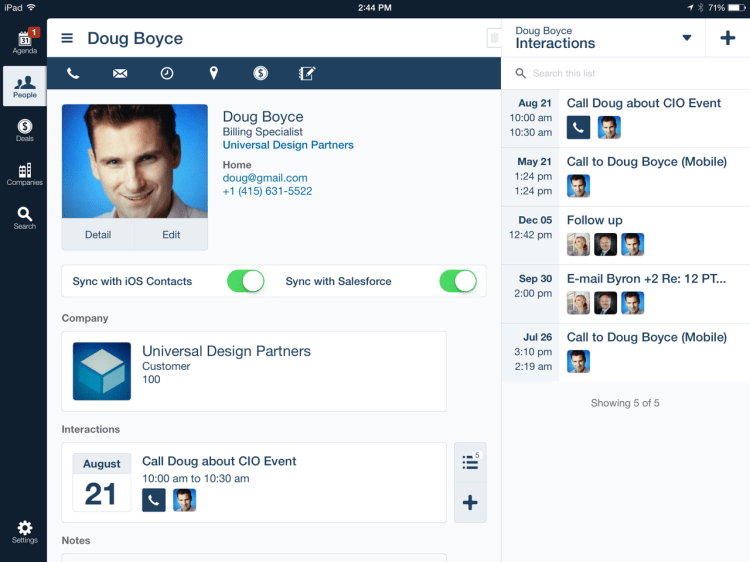There’s a dark hole in the Salesforce universe. It’s where sales reps keep their own notes on deals that may never pan out — and a startup is targeting that hole with an updated app.
“Sales reps never really liked customer relationship management,” AppMesh CEO, co-founder and ex-Salesforce employee Leo Tenenblat told VentureBeat. Salesforce, he added, “cares about reps, but it’s meant for managers.
“They are the guys paying for the product.”
He likened the omnipresent software to “a giant spreadsheet,” noting that sales reps often feel “like data clerks” filling in all the fields for each possible opportunity — by hand.
Then there’s the management of expectations … the sales manager’s in this case, not the customer’s. Reps don’t want to enter all their opportunities into Salesforce, he said, because “if some fall through, it looks bad to your boss.”
So these salespeople have been keeping all those non-certain opportunities elsewhere — in separate notes apps, contacts, calendars, maybe even paper notebooks. “All of that [other] info is stored somewhere,” Tenenblat said.
Enter SalesMesh 2.0 for iPads, iPhones, and iPod Touch. This “personal CRM” becomes available in Apple’s iTunes App Store tomorrow. (An Android version is being planned.)
It allows a rep to maintain their own opportunity info separately from Salesforce — that is, away from the manager’s eyes and expectations.
There are some other apps out there that also solve specific rep problems, Tenenblat told us, like providing an activity logger. But “we’re the only one that tackles the entire process the rep [goes through] and connects to all the data the rep needs.”
Don’t sales managers mind that reps are keeping two books?
Managers already know reps are keeping their own notes, he said. “They know that the reps are working on something and will share it publicly” when they’re ready. And, with SalesMesh in the process, the idea is that the data in Salesforce is now focused on the best opportunities, the ones the reps actually want to share.
The managers will now “believe what’s in Salesforce even more,” he said.
Tenenblat said that SalesMesh 2.0 is more integrated into the sources reps need than Salesforce is, so there is less manual entry involved. SalesMesh, however, is not cloud-based — except for a small cloud to help sync data between devices, each of which requires an app of its own. That means no cloud to share, and no cloud to access when there is little or no connectivity in the field.
Unlike the 1.0 version, which could only import contacts from Salesforce, the redesigned 2.0 has full integration of data back and forth with the mothership — but the sales rep determines what info is reported back to Salesforce’s company-wide platform.
In other words, if you want info about a deal in Salesforce to populate SalesMesh, you can import it. And you can selectively choose what SalesMesh-only info goes into Salesforce — and on your boss’ desk.
The San Francisco-based, 11-employee AppMesh, founded in the spring of 2012, has received about $4 million in funding thus far, mostly from InterWest Partners.
The earlier SalesMesh has been available for free for about 18 months, and AppMesh said it has had “tens of thousands of downloads.” The newest version will also be free for basic usage, with integration for a set number of Salesforce records. For unlimited integration, there’s a fee of $9.99 per month.
VentureBeat's mission is to be a digital town square for technical decision-makers to gain knowledge about transformative enterprise technology and transact. Learn More

